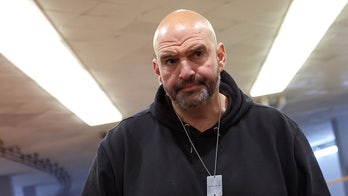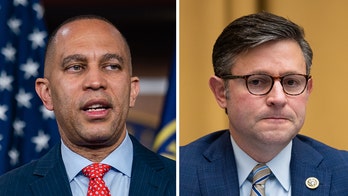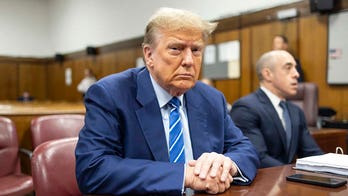Against an increasingly bitter campaign backdrop, President Obama is seeking to shore up support for his re-election in Virginia, a state he won four years ago ending decades of domination by Republican presidential candidates.
For challenger Mitt Romney, the state now looms as a battleground crucial to his presidential hopes.
Obama will travel to the southeast and southwest corners of the state Friday, courting young and African-American voters in the Virginia Beach-Hampton area before turning to more conservative Roanoke, unwilling to cede votes to Romney. On Saturday, he will campaign in Richmond, a once-staunchly Republican region that he won in 2008.
Both campaigns acknowledge Virginia's new role as a fiercely contested state after years of being virtually overlooked in presidential politics. Obama won the state by a 53-46 margin over his 2008 rival, Sen. John McCain.
Obama's visit comes after a day of hostile exchanges between the campaigns over Romney's tenure at the private equity firm he founded in 1984. Documents filed by the company, Bain Capital, conflict with Romney's statements about when he gave up control of the firm. Both sides accused the other of being dishonest.
The documents, filed with the Securities and Exchange Commission, place Romney in charge of Bain from 1999 to 2001, a period in which it outsourced jobs and ran companies that fell into bankruptcy. Romney and his aides say he left Bain in 1999 to run the Salt Lake City Olympics, and a Bain statement said Romney "remained the sole stockholder for a time while formal ownership was being documented and transferred to the group of partners who took over management of the firm in 1999."
Obama's two-day visit to Virginia underscores his stepped-up attention to the shortlist of key states that will determine the outcome of the presidential contest.
Virginia, with 13 electoral votes, figures prominently in both the Obama and Romney strategies. But Obama has more options for an Election Day victory without Virginia than does Romney. Illustrating its importance, the state has seen the third heaviest television ad spending by the candidates and their allied groups, behind only Ohio and Florida.
The state is represented by two moderate Democratic senators. But since Obama won four years ago, Republicans have done well in state offices and a majority of the state's congressional seats are held by Republicans.
Stephen Farnsworth, a political scientist at the University of Mary Washington in Fredericksburg, Va., said the state could well decide not only the presidential election but control of the Senate: Democrat Tim Kaine and Republican George Allen, both former governors, are in a tight race to succeed Sen. Jim Webb, a Democrat.
Obama is helped by the state's more moderate and Democratic Washington suburbs, by an unemployment rate that is well below the national average and by a minority population that voted heavily in his favor last time. Nearly 20 percent of the state's population is African-American, and its Hispanic presence has grown sharply in the past decade, especially in the north.
Romney can benefit from what Farnsworth called a "highly organized and relatively cohesive Republican Party in Virginia that is very capable of winning elections."
Obama could also gain from backlash over a controversial state law signed earlier this year by Republican Gov. Bob McDonnell that requires Virginia women to have an ultrasound test before an abortion.
What's more, former Republican Rep. Virgil Goode of Virginia is seeking to get on the Virginia ballot as the presidential candidate of the Constitution Party. If successful, he could draw precious votes away from Romney -- and Obama would not need to break 50 percent of the vote to win.
While touring the state, Obama will reiterate his call for extending Bush-era tax cuts for the middle class, insisting that households earning more than $250,000 revert to paying the higher rates they faced under President Bill Clinton. That stance puts him at odds with Kaine, who has called for retaining the Bush tax cuts for households earning less than $500,000. Obama's position is also opposed by Webb, who has rejected calls for any tax increase.
Despite its relatively low unemployment rate of 5.6 percent, the state relies heavily on military contracts that could suffer significantly under automatic spending cuts authorized by Congress and signed by the president last year. The Hampton Roads area that Obama is visiting Friday is home to a large military presence -- the world's largest naval base is there -- and its economy is heavily dependent on defense spending.
Campaigning Thursday in Virginia on behalf of Romney, former New York Mayor Rudy Giuliani told veterans in Virginia Beach that Obama would destroy the region's job base through defense spending cuts if he's re-elected.
"He has your region of the country right in his crosshairs," Giuliani said at a rally at a Veterans of Foreign Wars post. "I mean he can do more damage to you than he does to most of the rest of America if we should make the mistake of re-electing him because the cuts he has in mind for our military are devastating."
The proposed cuts in defense spending were designed to be so large that they would force Congress to adopt other means of reducing the deficit. Defense Secretary Leon Panetta has warned against the military spending cuts, and Obama has instead called for a mix of spending cuts and tax increases.
White House spokesman Jay Carney on Thursday blamed the deficit stalemate on Republicans for opposing increases in revenue.
"The across-the-board cuts were objectionable and onerous to both sides for a reason," he said. "That's why Congress has to act."





